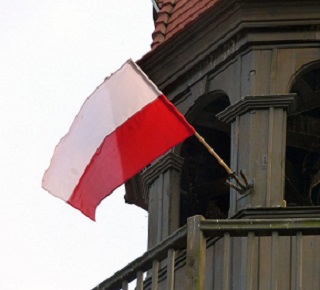President Obama on Polish Freedom
Here’s a third chance to practice foreign policy vocabulary, in a 2014 speech by President Obama on Polish freedom. It follows two related pages with speeches by Presidents Kennedy and Reagan: Practice Academic Vocabulary with JFK’s first State of the Union Address, and U.S. Presidents on Berlin.
All three have gaps to fill in with words from the Academic Word List. You can find the text of the complete speech here.
Studying these speeches and words should help you understand news on foreign policy and foreign events in English. (See also The News in English.) Much of the vocabulary is also used in academic or business settings, and on tests like the IELTS, TOEFL, or SAT.
Hints for Filling the Gaps in this Speech

You don’t need to start by studying these hints. If you prefer, jump right to the gap-fill practice. You can look back at these if you need a hint later.
First look at the place of the word in the sentence. Words after ‘the’ or ‘a’ are nouns (or sometimes adjectives and then nouns.) Words that end in the suffixes –ion, -ment, -ship, or –ity will also be nouns.
Adjectives usually go before nouns or after forms of the verb ‘to be’ (is, are, was, were, will be, etc.) Common adjective suffixes are –able or –ible, -al, -ary, -ic, -ed, and –in (the last two come from verbs.)
A verb infinitive (with no tense endings like –s, -ed, or –ing) usually follows ‘to.’ Other verbs can be in any tense. (Like nouns they sometimes end in –s, and like adjective they often end in –ed or –ing.)
Adverbs (often ending in –ly) often come after verbs (“run quickly; dance gracefully”) or in the middle of a compound verb (“will usually look”; “can sometimes find”). Learn more about recognizing parts of speech from their suffixes on Suffix List.
Notes on the Gap Word Meanings:
‘On behalf of’ means representing—doing something to show the feelings or intention of the group you represent. “I’m bringing you these flowers on behalf of our whole office. We all want you to get well soon and get back to work.”
To challenge is to push someone to do something difficult or question their authority.
A commitment is a promise. “When you borrowed that money you made a commitment to repay it in two months!” “Traditional marriage vows are a lifelong commitment that people may find difficult to keep.”
To define means to explain or give the meaning of something.
To impose is to force your will or ideas on others. Totalitarian regimes often impose many restrictions on their people because they want to control them.
Inevitable means unavoidable—something that will certainly happen.
To invest is to spend money or time (or lives) now in order to get something bigger back in the future.
To participate is to have a part in something—to be actively involved.
A partner is someone who works closely with you—a joint owner of a business or close associate that wants the same results.
Principles are basic values
A regime is a government—usually an authoritarian one. We don’t use the word to refer to democracies.
Revolutionary means a complete, major change or turn-around.
Security means safety.
Ultimately means ‘in the end.’
Here are the words to fill in the gaps (spaces—see the drop-down menu after each space to choose):
challenge, commitment, impose, inevitable, investing, participated, partner, principles, regime, revolutionary, security, ultimately.
Gap-fill Practice: Selections from Obama's Speech on Polish Freedom
I hope these exercises were helpful. If you would like to learn more vocabulary related to democratic debate and American politics, try Political Language, with words for working together or against another group and some common American political groupings.
Home> How to Learn Professional Vocabulary > President Obama on Polish Freedom.
Didn't find what you
needed? Explain what you want in the search box below.
(For example, cognates, past tense practice, or 'get along with.') Click to see the related pages on EnglishHints.
| site search by freefind | advanced |





